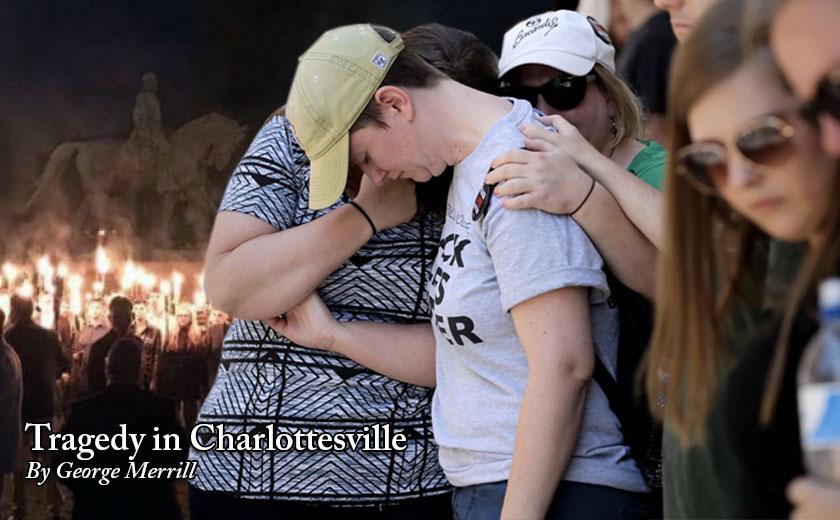The tragic clash in Charlottesville recently and the president’s disappointing equivocation about its perpetrators is one more toxin added to the already poisoned atmosphere in which Americans live daily.
I’ve seen selfless service and goodness exercised in public life: Gandhi, Mother Theresa, Nelson Mandela, Martin Luther King, Jr., Elie Wiesel, Eleanor Roosevelt, Dag Hammarskjold and Shimon Peres – to name a few. These are the men and women I’d want my children to emulate. They’re strong and loving people. They care. My concern is that today’s young people are being fed a steady diet of cynicism through sensationalistic media outlets, which, by the way, Americans devour voraciously.
I believe our national discontent indicates a deep hunger for inspired leadership, for authenticity and for the hope that can lift us up and help us live the greatest challenge to our existence: how to love one another. Loving one another is the ultimate challenge in life. Everything else is secondary. Inspiration and hope are available, but today you have to look hard. It’s like panning for gold in a streambed. The constantly moving water stirs up dirt and obscures the gold.
How shall we “sing the Lord’s song in a strange land,” is a challenge as relevant today as it was over two thousand years ago when the grieving psalmist, longing for his true home, first spoke these words.
Thomas Merton is a name well known in and out of religious circles. Seven Story Mountain, his autobiography written in 1948, concerned his conversion to Catholicism and his eventual entrance into the Trappist community. The story fascinated believers and non-believers alike. I read it as a teen-ager and I remember little of it. I do recall the feeling that it temporarily awakened in me. It was that feeling all of us have had at one time or another. It’s when on a dark night, we watch the stars and a feeling of awe becomes visceral, working itself up from deep within us and lodging in our throats. Merton’s spiritual vision extended beyond the banks of conventional religion to excite people’s imagination about the awe inspiring wonders of spiritual awareness.
I was surprised to read not long ago about how, years after he wrote it, Merton began to critically examine his own motives in writing it. He had uneasy feelings about it’s tone which he regarded as condescending, giving the impression that the cloistered life of the monk was the ideal spiritual path to follow.
What amazed me was how a spiritual giant like Merton who could “speak with the tongues of men and of angels,” still retained a fearless openness, curiosity and transparency. He was able to take a hard look at himself and what he was about. In one sense, his own spiritual growth process spoke even more loudly about living a life of spiritual depth, perhaps even more than did his thoughts he wrote about earlier. He was not dogmatic and hardwired to defend ideas he once held. He enjoyed enough of the spirit of wisdom to understand that spirituality is a process of constant change, not static “beliefs” that demand unquestioned loyalty.
Years later he said of his book, “this is the work of a man I have never even heard of.” He knew his spirit still missed something and he still hungered.
In 1958 he had an experience that again changed his life, but this change, in my estimation, is the most profound.
He was still writing and had been in Louisville Kentucky to meet his publisher. Merton was walking though a shopping district at the corner of Fourth and Walnut Streets. He became acutely aware of all the people around him. He was suddenly overwhelmed with the feeling that he loved them all. In his words: “ . . . they were mine and I theirs, that we could not be alien to one another even though we were total strangers. It was like waking from a dream of separateness.” He recognized “the secret beauty of their heart.” He described them as shining brilliantly like the sun.” He goes on to say: “If only we could see each other that way all the time; there would be no more war, no more hatred, no more cruelty, no more greed. I suppose the big problem would be that we would fall down and worship each other.”
Big problem? Not in my book. That’s a more excellent way than shooting each other, driving cars into crowds and bombing innocents in market places.
I know we hunger for a vision of ourselves and our nation that inspires and lift us up. Witnessing to love is the most compelling vision of all.
Columnist George Merrill is an Episcopal Church priest and pastoral psychotherapist. A writer and photographer, he’s authored two books on spirituality: Reflections: Psychological and Spiritual Images of the Heart and The Bay of the Mother of God: A Yankee Discovers the Chesapeake Bay. He is a native New Yorker, previously directing counseling services in Hartford, Connecticut, and in Baltimore. George’s essays, some award winning, have appeared in regional magazines and are broadcast twice monthly on Delmarva Public Radio.



Write a Letter to the Editor on this Article
We encourage readers to offer their point of view on this article by submitting the following form. Editing is sometimes necessary and is done at the discretion of the editorial staff.